Nearly two in three Londoners will listen to friends and family when deciding who to vote for at the upcoming General Election, well above the national average.
In an Ipsos poll last month, 65% of London residents said they would listen a great deal or a fair amount to friends and family when making their voting decision, compared to less than half of those living in the rest of the country.
This placed it as the group that the public were most likely to listen to nationwide, scoring higher than politicians (45%) and political commentators (44%) as well as journalists (39%).
Crucially, friends and family were also the only group polled that nationwide scored as more likely to be listened to than not when it comes to deciding who to vote for at the General Election.
As the election approaches, Electoral Calculus currently predicts 66 of London’s 75 seats will go to Labour, leaving the Conservatives with just three seats, down from 22 in 2019.
Could it be that this higher relative level of trust in friends and family is determining the predictions of how people will vote?
Dr James Griffiths, Research Fellow for the British Election Study, spoke of how political discussants (the people that an individual talks to about politics) can be highly consequential in how an individual ultimately votes.
However, he threw caution in that it is hard to disentangle the reasons why.
He said: “It’s difficult to know whether someone is voting for a party because they talked about politics with their friends, but it also could be they tend to talk about politics with people they agree with.
“If they didn’t agree with their friends and were constantly arguing, they may not want to talk about politics with those people.”
A 2014 British Election Study piece found that someone having friends and family who support a party substantially increases the chances of that person switching their allegiance to that particularly party.
Griffiths noted: “I would expect that the impact of discussing politics and who you discuss politics with will probably continue to be important in the next election.
“However we don’t necessarily know whether that’s more likely to be in an echo chamber sense or a social pressure sense.”
This could mean that if enough people already wish to vote for one party, those that are undecided may be more likely to vote for that party too if they discuss politics with friends and family, as those friends and family have a high chance of supporting said party.
This could form what is referred to in politics as a bandwagon effect, which Ian McAllister and Donley T. Studlar refer to as where undecided voters favour a party that is doing well in the polls.
It’s therefore important to see the main flows of voting intention in the run-up to the General Election to understand how these findings can explain the trends.
In 2023, British Election Study panel data released showed the changes of an individual’s vote from the 2019 General Election to their voting intention as of 2023.
Although the results only show intentions from May last year, aggregate polls have shown to remain relatively unchanged over the past 12 months, with the exception being an increase in those intending to vote for Reform UK.
The results above highlight two key flows of voters: those from the Conservatives to Reform UK, and those who abstained in 2019 to Labour.
Importantly, Labour are performing as the most popular party both nationwide and in London.
Rob Ford, Professor of Political Science at the University of Manchester, explained these patterns.
He said: “The Tories face an impossible task to please everybody in the coalition they built in 2019 when you no longer have an election that’s focused on Brexit or not being Jeremy Corbyn.”
He described those leaving to Reform UK as people that are upset on immigration, feel that Brexit has failed, and typically are of an older demographic.
For those moving to Labour, he said these voters are far more concerned on domestic policy and feel that the Conservatives have failed on public services and the economy, by focusing too much on immigration and other foreign policy.
He described this collective flow of voters leaving the Conservative Party as a tide, a tide of sentiment from people who almost universally feel that the Government has failed.
He added: “It’s a Government that’s regarded as failing to deliver on the basic things that people expect Governments to do.”
Ford also noted the impact that tribal lines related to Brexit could have on the result.
He said that generally those voting Labour align with the remain caucus, while those in the shrunken Conservative coalition predominately voted Leave.
He said: “You don’t just vote Leave or Remain, you are Leave or Remain. You wear it like a badge.”
This could mean many voters’ minds are already made up by which way they voted in the 2016 EU Referendum, especially if they typically converse politics with those that agree with them.
Ford closed: “The perception is that this is a tired old Government that people want out.
“Once that idea is entrenched, it’s very hard to get rid of.”
On this last comment, it could be such a pervasive idea in society now that the Conservatives have failed in Government, that by people talking to friends and family about politics they are likely to encounter this view and potentially take it on themselves.
Ultimately, the election will have many factors at play for how voters decide how to vote, but as commentator Kamal Ahmed recently said: “This is going to be an election of the undecideds.”
If Ahmed is right, who these undecideds talk to may be crucial in determining the overall results of the election.
And as we near polling day, we may begin to see in the polls just how these flows take shape and quietly determine the makeup of the next Parliament.





